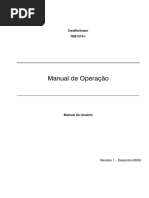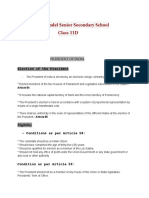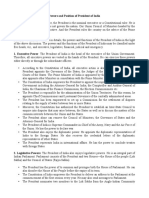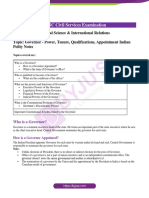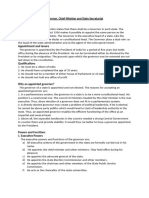0 ratings0% found this document useful (0 votes)
24 viewsCivics Chapter 2 - The Union Executive 2
Civics Chapter 2 - The Union Executive 2
Uploaded by
Thangsian KhaiThe document discusses the qualifications, election process, powers and duties of the President and Vice President of India. It outlines the eligibility criteria for candidates, composition of the electoral college, terms of office and procedures for impeachment. The President's executive, legislative and emergency powers are also summarized.
Copyright:
© All Rights Reserved
Available Formats
Download as PPTX, PDF, TXT or read online from Scribd
Civics Chapter 2 - The Union Executive 2
Civics Chapter 2 - The Union Executive 2
Uploaded by
Thangsian Khai0 ratings0% found this document useful (0 votes)
24 views18 pagesThe document discusses the qualifications, election process, powers and duties of the President and Vice President of India. It outlines the eligibility criteria for candidates, composition of the electoral college, terms of office and procedures for impeachment. The President's executive, legislative and emergency powers are also summarized.
Copyright
© © All Rights Reserved
Available Formats
PPTX, PDF, TXT or read online from Scribd
Share this document
Did you find this document useful?
Is this content inappropriate?
The document discusses the qualifications, election process, powers and duties of the President and Vice President of India. It outlines the eligibility criteria for candidates, composition of the electoral college, terms of office and procedures for impeachment. The President's executive, legislative and emergency powers are also summarized.
Copyright:
© All Rights Reserved
Available Formats
Download as PPTX, PDF, TXT or read online from Scribd
Download as pptx, pdf, or txt
0 ratings0% found this document useful (0 votes)
24 views18 pagesCivics Chapter 2 - The Union Executive 2
Civics Chapter 2 - The Union Executive 2
Uploaded by
Thangsian KhaiThe document discusses the qualifications, election process, powers and duties of the President and Vice President of India. It outlines the eligibility criteria for candidates, composition of the electoral college, terms of office and procedures for impeachment. The President's executive, legislative and emergency powers are also summarized.
Copyright:
© All Rights Reserved
Available Formats
Download as PPTX, PDF, TXT or read online from Scribd
Download as pptx, pdf, or txt
You are on page 1of 18
Revised syllabus
The Union Executive
(a)The President
• Qualifications for election,composition of Electoral
College,reason for indirect election,term of
office,procedure for impeachment.
• Powers : executive,legislative,discretionary and emergency
(only the three types of emergencies and circumstances
leading to proclamation of these emergencies).
2. The Vice-President
• Qualifications for election and term of office and powers.
Qualifications for election for President
1. Should be citizen of India
• Should be above 35 years of age
• Should be qualified for election as member of
Lok sabha.
2. should not hold office of profit under the
government. However the post of
President ,Vice-President or a minister of
union or state is not considered office of
profit.
Additional requirements
• A prospective presidential candidate is
required to get his nomination paper
proposed by atleast 50 electors and seconded
by another 50 electors.
• The Presidential candidate has also to deposit
a security of 15,000 while filing his nomination
papers, which stands forfeited if a candidate
fails to get atleast 1/6th of the total votes.
Composition of Electoral College
• President is elected indirectly by members of
an electoral college consisting of:
1. the elected Mp’s and Mla’s including
National capital Territory of Delhi and the
Union Territory of Puducherry.
Reason for indirect election
• He could become rival centre of power to the
council of ministers.
• Direct election could make him a nominee of
the ruling party like the prime minister.Such a
President could not represent the constituent
states of the Union.
• waste of time and money
• To show that he is only a nominal head and
not the real head.
Term of office
• 5 yrs.
• He can resign his post before the expiry of the term
by submitting letter of resignation to vice-president.
• He also can be removed by the process of
impeachment , for the violation of constitution or
incapacity
• Death- In case of death or resignation of President,
the new president must be elected with in six
months.Till then, the Vice-President acts as the
President.
Procedure for Impeachment
1. Either house of parliament can level the
charge as follows:
a. resolution which is moved after atleast 14
days notice in writing signed by not less than
1/4th of total members of house and
b. the resolution passed by a majority of not
less than 2/3rd of the membership of the
house.
Continued…
2. when a charge has been so preferred by
either house of Parliament, the other house
will investigate the charge and the president
has the right to appear and to be represented
at such an investigation.
3. As a result of investigation, if the charge is
passed by majority of not less than 2/3 rd of
the total membership of the house, president
will be impeached.
Powers of President
a. Executive Powers
1. Head of Union Administration-All executive orders are issued in
the name of President.
2.Appointment of officials of state- He appoints
The Prime Minister and the council of ministers on Pm advice,the
chief Justice and the Judges of Supreme Court and the High
Courts,The governors of states,The lt-Governors and the chief
commissioners of the union territories,The Attorney General of
India,The Comptroller and Auditor General of India,The Chairman
and memvers of Union Public Service Commision, The chairman
and members of the economic commission.
4. Control over state Governments
5. Administration of Union territories and border areas.
Legislative Powers
1. Addresses the sessions of the Parliament- First session of every year and the
first session after the house assemble together after the general elections to the
LokSabha.
2. Messages to Parliament-He can poewer to send messages to either house of
Parliament on any matter relating to Parliament.
3. Summons and Prorogue the house
4. Dissolve the Lok sabha
5. Nominate 12 members to Rajya sabha from among persons having special
knowledge in literature,science,art and social service
6. Assent to Bills– three options open in front of president when ordinary bills
comes to him for assent for the first time
a. may give his assent
b. may withhold the bill
c. send it back to the house with recommendations but if the bill is passed in the
same form,president have to compulsory sign the bill.
Continued….
7. Promulgate ordinances– Definition – An temporary law made by President when both of
the house of parliament is not in session. It will have the same status as an Act of
Parliament.
Conditions—
i. President is satisfied that the circumstances make it necessary to take immediate action.
ii. When both the houses of parliament is not in session.
iii. Ordinance must be laid before both the house of Parliament when they reassemble.if
Parliament do not approve them,it lapses.normal time to approve ordinances-6 weeks.
iv. Ordinances lapses if it is replaced by Act of Parliament
8. Assent to some state bills---
circumstances- Governor may reserve some bills passed by the state legislature for
consideration of the President.
9. Formation of new states.
10. Changing of names of states
Discretionary powers
• Appointment of PM when no single party commands clear support of majority of loksabha members.( in case of
hung parliament)
• Appointment of PM in case of sudden death
• Appointment of PM, When the ruling party has lost majority in loksabha
• When vote of no-confidence has been passed against it,recommends the president to dissolve Lok sabha,then it is at
the discretion of president to either dissolve the house or ask another party to prove majority in Lok sabha.
• The president can dismiss ministers in case the Council of Ministers loses the confidence of the house but refuses
to resign.
• The President may withhold his assent to a bill or may send it back for reconsideration of the houses, if it is not a
money bill.
• The constitution does not prescribe any time limit within which the President is to declare his assent or refusal or to
return the bill.By reason of this absence of atime limit, the President may simply keep the bill on his desk for an
indefinite time period. [ refereed to as ‘pocket veto’]
• The President enjoys the right to seek information from PM regarding the administration of the affairs of the Union.
• A caretaker government at the centre can not take any major decisions. The President can restrain such a
government from taking such decisions.
• In case of state money bill reserved by Governor , President may either declare his assent or withhold his asssent.
• In case of state non-money bill, President may instead of declaring his assent or refusing it, direct the governor to
return the Bill to the Legislature for reconsideration. In the latter case, the Legislature must reconsider the Bill within
six months and if it is passe again, the bill shall be presented toPresident again. But it shall be obligatory upon
President to give his assent in this case too.
Emergency powers
• 1. National Emergency
• Circumstances – if President is satisfied that a
grave emergency exists whereby the security
of India or any part of its territory is
threatened,either by war or by external
aggresion or armed rebellion. He cannot
declare this emergency unless he has the
approval in writing of the union cabinet.
2.Breakdown of Constitutional emergency
• Circumstances- if president, on receipt of a
report from the governor or otherwise,is
satisfied that the governance of the state
cannot be carried on in accordance with the
provisions of the constitution.it is also called
as president’s rule.
Financial Emergency
• Circumstances-If the president is satisfied,that
the financial stability or credit of the country
or any part of it is is threatened or has
occurred or is likely to occur.
The Vice-President
• Qualifications
A person seeking election as Vice-President, shall be
a) A citizen of India
b) has completed the age of 35 years; and
c) is qualified for election as member of the
councilof states (Rajya Sabha)
d) He/she will not be eligible if he/she holds any
office of profit under state or central government.
Term of office
• The vice-President shall hold office for a
period of five years.
• He may resign by submitting resignation letter
to President of India.
• He/she may be removed for the violation of
constitution, be removed from the office by
the process of impeachment.
Powers of Vice-President
1. Chairman of Rajya Sabha: The Vice-President of India
acts as the ex-officio Chairman of Rajya sabha.
2. Taking over as the President: The Vice-President
takes over the office of the President under the
following situations:
a. death of President,
b. resignation of the President,
c. removal of the President,or
d. When the President is unable to discharge his or her
functions owing to absence,illness or any other cause.
You might also like
- The Enfranchisement LotteryDocument24 pagesThe Enfranchisement LotteryCarlos Adrian J.No ratings yet
- Yahoo Tabs UkraineDocument10 pagesYahoo Tabs UkraineKelli R. Grant100% (1)
- Cardioversor D10 - TEBDocument39 pagesCardioversor D10 - TEBBrunoNo ratings yet
- President: Electoral CollegeDocument22 pagesPresident: Electoral CollegeNandhanaa NithanyaaNo ratings yet
- President of IndiaDocument19 pagesPresident of IndiaChiku Bhaina vlogNo ratings yet
- DOC-20241126-WA0042Document56 pagesDOC-20241126-WA0042abhinabasanyal28No ratings yet
- Qualifications For President of IndiaDocument4 pagesQualifications For President of IndiapranavNo ratings yet
- PIP_ UNIT 2Document53 pagesPIP_ UNIT 2Rahul ANo ratings yet
- Notes_The Union ParliamentDocument8 pagesNotes_The Union ParliamentsaachikanekarNo ratings yet
- 2408160608165440479the President and The Vice PresidentDocument15 pages2408160608165440479the President and The Vice PresidentgwdreamlandNo ratings yet
- Constitutional Law Till DateDocument35 pagesConstitutional Law Till DateDivyam SharmaNo ratings yet
- Polity Notes Manuj Jindal AIR 53Document250 pagesPolity Notes Manuj Jindal AIR 53Pooja Reddy100% (5)
- By Ankit Bajad SirDocument47 pagesBy Ankit Bajad SirMonalisha PattraNo ratings yet
- CI Unit 2, ch-6Document18 pagesCI Unit 2, ch-6srinathrn7No ratings yet
- Module-3 Central Government 2Document35 pagesModule-3 Central Government 2shubh suriNo ratings yet
- President of IndiaDocument9 pagesPresident of IndiaAlokNo ratings yet
- Union Executives 291674218996584Document54 pagesUnion Executives 291674218996584Andy bloaterNo ratings yet
- Union Executive NotesDocument7 pagesUnion Executive NotesVruti Doshi100% (1)
- The President and Vice PresidentDocument8 pagesThe President and Vice Presidentsoulaesthetic85No ratings yet
- Union Exective and State ExecutiveDocument32 pagesUnion Exective and State ExecutiveAyan SiddiquiNo ratings yet
- Civics NotesDocument14 pagesCivics Notesmadhu.mavdikarNo ratings yet
- Union LegislatureDocument56 pagesUnion LegislatureSwara AnkaramNo ratings yet
- President: Election of The PresidentDocument8 pagesPresident: Election of The PresidentDhruva Chandra PandeyNo ratings yet
- UntitledDocument10 pagesUntitledAlok SaraSwatNo ratings yet
- Civics Chapter 1 - The Union LegislatureDocument35 pagesCivics Chapter 1 - The Union LegislatureThangsian KhaiNo ratings yet
- Polity Governor, CM and State Legislature NotesDocument7 pagesPolity Governor, CM and State Legislature NotesetherealscrutiniseNo ratings yet
- Powers and Position of President in Indi PDFDocument3 pagesPowers and Position of President in Indi PDFPayal ParekhNo ratings yet
- Powers and Position of President in Indi PDFDocument3 pagesPowers and Position of President in Indi PDFmanish365No ratings yet
- Part V - Union Executive - President Lecture 20 of The Indian Polity SeriesDocument31 pagesPart V - Union Executive - President Lecture 20 of The Indian Polity Serieschandan sharmaNo ratings yet
- Union ExecutiveDocument24 pagesUnion Executiveswarlata.pandeyNo ratings yet
- civics ch 2Document7 pagescivics ch 2gillekam185No ratings yet
- The State LegislatureDocument22 pagesThe State Legislatureashutosh18690No ratings yet
- The president and vice presidentDocument12 pagesThe president and vice presidentapoorvejoyiahydraNo ratings yet
- IC- 2 UNITDocument31 pagesIC- 2 UNITrushikarushi99No ratings yet
- The President and the Vice President , The Prime Minister and the Council of MinisterDocument7 pagesThe President and the Vice President , The Prime Minister and the Council of MinisterMysticXavierNo ratings yet
- The President & The Vice PresidentDocument8 pagesThe President & The Vice Presidentnvdxdpq7prNo ratings yet
- Government_of_the_UnionDocument72 pagesGovernment_of_the_Unionrahibaparveen200589No ratings yet
- Governor Indian Polity Notes PDFDocument5 pagesGovernor Indian Polity Notes PDFsanjayrakshita100% (1)
- Polity 11 PresidentDocument45 pagesPolity 11 PresidentGaurav KumarNo ratings yet
- President of IndiaDocument10 pagesPresident of IndiaPriti PatelNo ratings yet
- 3892Chapter 3 Civics class 8Document20 pages3892Chapter 3 Civics class 8dhirendrarath123No ratings yet
- State AdministrationDocument6 pagesState AdministrationRose ChuchaNo ratings yet
- Civics ch-2Document11 pagesCivics ch-2Sadik farhat MollaNo ratings yet
- State ExecutiveDocument31 pagesState ExecutiveTribhuwan Pant0% (1)
- Executive Branch - LectureDocument12 pagesExecutive Branch - LectureGayle Abaya100% (2)
- Union ExecutiveDocument4 pagesUnion Executiverubywilliams450No ratings yet
- Powers and Position of President of IndiaDocument9 pagesPowers and Position of President of IndiaSakshamNo ratings yet
- State GovernmentDocument4 pagesState GovernmentBasheer1014No ratings yet
- Polity 21 VicepresidentDocument24 pagesPolity 21 Vicepresidentwvpj5q5j74No ratings yet
- Governor Ppt 1Document11 pagesGovernor Ppt 1Namitha NNo ratings yet
- State Government-Running Notes 2023-24Document3 pagesState Government-Running Notes 2023-24Marwa SuhailNo ratings yet
- civics notesDocument3 pagescivics notesnaitikagrawal8thcNo ratings yet
- Class 10 The President NotesDocument4 pagesClass 10 The President Notessheikhmohammed539No ratings yet
- The Union ExecutiveDocument25 pagesThe Union ExecutiveAvi Math100% (1)
- Executive Edited by NamiDocument13 pagesExecutive Edited by NamiKashak SoniNo ratings yet
- Indian Polity SoftDocument9 pagesIndian Polity Softharinandana1823No ratings yet
- CS Module 2Document45 pagesCS Module 2btech25065.21No ratings yet
- Consti 2Document16 pagesConsti 2rijasrahim1020No ratings yet
- Xero or Hundred BookDocument12 pagesXero or Hundred BookRajveer NaharNo ratings yet
- Australian Political Essays – Recommendations for Parliamentary Reform (How to Fix Parliament)From EverandAustralian Political Essays – Recommendations for Parliamentary Reform (How to Fix Parliament)No ratings yet
- A Long Walk To FreedomDocument5 pagesA Long Walk To FreedommuzaffaralhashmimaazmuzaffarNo ratings yet
- In The High Court of Delhi at New DelhiDocument5 pagesIn The High Court of Delhi at New DelhisandeepNo ratings yet
- PMCBRNhtatore 001 Data 421Document324 pagesPMCBRNhtatore 001 Data 421nishantNo ratings yet
- Topic 1 Lesson 2 LV 1ere GDocument2 pagesTopic 1 Lesson 2 LV 1ere GMosslim DriouchNo ratings yet
- Towards-a-Theory-of-Childrens-Participation - N Thomas - 2007Document21 pagesTowards-a-Theory-of-Childrens-Participation - N Thomas - 2007JOSE MARIA LEZANANo ratings yet
- Rule Book: 1.0 IntroductionDocument32 pagesRule Book: 1.0 Introductiongiordano manciniNo ratings yet
- 2007-186 Routes CityDocument9 pages2007-186 Routes CityKit Delgado CameñaNo ratings yet
- 06 - List of CasesDocument17 pages06 - List of CasesRatanSinghSinghNo ratings yet
- INCOMEDocument558 pagesINCOMEAnshu SinghNo ratings yet
- Soal STS Smadhika Mapel Pak Kelas 10Document3 pagesSoal STS Smadhika Mapel Pak Kelas 10laurenttantan3No ratings yet
- Adeesh Babu Portfolio 2018Document9 pagesAdeesh Babu Portfolio 2018adeeshmidasNo ratings yet
- Appendix 2: Civic Engagement Example Activities: Grade Level Activities/ DescriptionDocument72 pagesAppendix 2: Civic Engagement Example Activities: Grade Level Activities/ DescriptionBellaNo ratings yet
- The Radical Right in France and West Germany ("The Radical Right - A World Directory", by C.O'Maolain, 1987)Document63 pagesThe Radical Right in France and West Germany ("The Radical Right - A World Directory", by C.O'Maolain, 1987)AkuAnkaNo ratings yet
- Rizal's First Travels Abroad and Noli Me TangereDocument31 pagesRizal's First Travels Abroad and Noli Me TangereJudith DurensNo ratings yet
- Relationship Between China and The Philippines. Consider The Economic, Political, and Social Factors.Document2 pagesRelationship Between China and The Philippines. Consider The Economic, Political, and Social Factors.Sapag PatakNo ratings yet
- Global Citizenship: Reflection PaperDocument2 pagesGlobal Citizenship: Reflection PaperJolina A. EnardecidoNo ratings yet
- Lawatan Pelajar Jepun 2011Document244 pagesLawatan Pelajar Jepun 2011Aidil AbdullahNo ratings yet
- T H 769 Ks1 The Life of Queen Elizabeth II PPT Ver 3Document12 pagesT H 769 Ks1 The Life of Queen Elizabeth II PPT Ver 3João PauloNo ratings yet
- Trees NotesDocument6 pagesTrees Noteshajajg66No ratings yet
- PI 100 - ACLE Reaction PaperDocument4 pagesPI 100 - ACLE Reaction PaperApple GonzalesNo ratings yet
- Coalition Letter Urges New York State Leaders To Protect and Strengthen Democracy in 2023Document5 pagesCoalition Letter Urges New York State Leaders To Protect and Strengthen Democracy in 2023The Brennan Center for JusticeNo ratings yet
- 18th Amendment CriticismDocument3 pages18th Amendment Criticism9 years oldNo ratings yet
- PDF Cuadro Comparativo Taylorismo Fordismo Toyotismo Opex - CompressDocument1 pagePDF Cuadro Comparativo Taylorismo Fordismo Toyotismo Opex - CompressheberNo ratings yet
- Michael J. Glennon - National Security and Double Government-Oxford University Press (2014)Document270 pagesMichael J. Glennon - National Security and Double Government-Oxford University Press (2014)William HaddockNo ratings yet
- Jonathan and Buhari Foreign PolicyDocument16 pagesJonathan and Buhari Foreign PolicysamuelNo ratings yet
- History and Theory of FeminismDocument20 pagesHistory and Theory of FeminismNauman MashwaniNo ratings yet
- 2018.12.31 (55) OZAWA - Response To S CT Order Dated 12-28-18 - WATERSDocument13 pages2018.12.31 (55) OZAWA - Response To S CT Order Dated 12-28-18 - WATERSHonolulu Star-AdvertiserNo ratings yet



